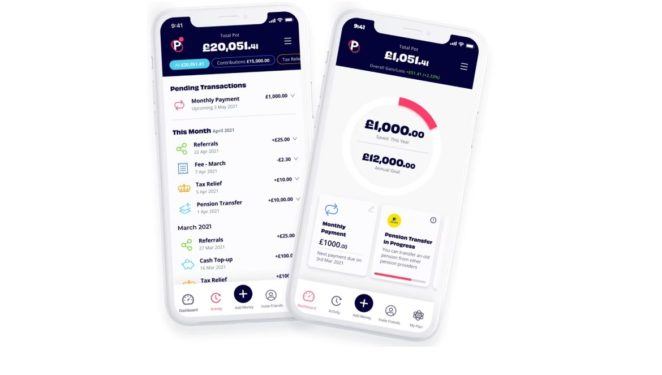Digital pension provider Penfold is ramping up its brand advertising in 2022 as it looks to expand its reach across the whole of the UK pension market, according to the company’s Co-founder Chris Eastwood.
The company was founded in 2018 “to address the problem in society that the majority of the population aren’t saving enough for later life,” Chris tells the Financial Services Forum.
The company started with the self-employed market, of which only 31% have any pension savings whatsoever.

In 2021, Penfold expanded its product beyond self-employed people as it launched a workplace pension product for full-time employees, seeing its customer base more than double year-on-year to 40,000.
“We’ve seen really fantastic uptake from large and fast-growing businesses, using Penfold to differentiate their pension packet from just using old-school providers to one that provides a more engaging experience to their employees,” Chris says.
The move has been accompanied by Penfold’s first move into brand advertising, with a major multimedia campaign across TV, on-demand and out-of-home launching in September.
“The problem of people not saving enough is a direct consequence of the terrible customer experience provided by existing providers, who make it too difficult with their dusty products, complex messaging and lack of customer service.
“It was important to differentiate our brand, both in terms of visuals and attitude, so our audience understand that Penfold offers a modern customer experience, you can expect modern levels of interaction from us, we are not like the old providers.
“We want our audience to instantly understand that we’re here to take the complexity out of pensions and solve the problem of preparing for life after work, so that they can get back to enjoying the here and now. We do this by making the savings process simple and effortless and focus on delivering an experience that actually gets them to their saving goals, so they no longer need to worry.”
The messaging draws on the increasingly popular concept of “financial wellbeing”, which encapsulates the industry’s shift away from selling products to helping people achieve an outcome.
“This really does reflect our core values as a company. As you would hear at the start of any of our internal strategy sessions, the first message is always about how can we help people actually stop working one day and live comfortably in retirement.
“We’ve got a very long roadmap of product innovations to help our customers with that ultimate final outcome.”
The move to above the line advertising will continue in 2022.
“As a lot of early-stage businesses did, we started with a largely digital, performance-based marketing approach,” explains Chris. “September was the first meaningful above the line campaign to really announce Penfold as a modern fresh alternative to the traditional providers which may have caused you pension worries in the past.”
The company plans to build on this awareness with a “more response-driving” campaign later this quarter which will more specifically focus on how customers can use the product.
The advert very much plays up the difference between Penfold and “the old way” of doing pensions. Chris says Penfold is a fintech company rather than as a peer of traditional pension providers.
“When I talk about the industry making things too hard, the reason this exists is the technology on which they operate pensions schemes is incredibly outdated. It is very inefficient and costly to run a pension scheme, there are people doing jobs a computer should do and lots of paperwork.”
Some companies outsource aspects of this, but Chris says this further increases costs and diminishes the customer experience.
“Our customer experience doesn’t just mean a slick app – we’ve got real humans who are super helpful when questions come up and when people want to transfer and hunt down old pots.”
This type of experience is much harder to offer for the traditional providers, which is why the systems needed to be rebuilt from the ground up.
“This allows us to plug in a modern customer experience on top and really keep innovating in how we provide pensions. We certainly see ourselves as a tech firm first and foremost, automating everything we can and improving the processes behind the scenes to deliver those customer outcomes.”
Chris says 2022 will see a further focus on making Penfold intuitive and easy for both customers and employers.
“As well as continuing to improve the experience for employers, the focus really is on continuing to deliver more and more around that core pension experience. In particular, we’re revamping the goalsetting process – how customers think about their final trajectory and what they need, and how they get from A to B.”
There will also be an increased focus on sustainability and whether Penfold can go further for those customers who are interested in using their pension savings to make an impact against climate targets.
Behavioural science and the self-employed
In December, Penfold launched a pilot with Nest Insight and the Department for Work and Pensions which sees Penfold augmenting its offering for the self-employed to overcome common barriers to saving.
“It’s not that pensions are an unattractive way to save for later life. They’re still the most tax efficient way to save. It’s not that people can’t afford to set aside money, although that does apply in some cases. It’s that the industry makes it too difficult.”
He cites the traditional industry’s paperwork, complex jargon, difficult to use platforms and non-existent customer service as factors that are deterring would-be customers.
“Even if someone self-employed wants to save for later life, all of those barriers stack up and it drops to the bottom of the to-do list.
“People are time poor. These complex, difficult processes put off even those people who are sold on the idea. It’s a combination of that education piece and making people aware and providing the technology to make that seamless.
“If you use technology to make it a matter of minutes, if you explain the benefits in understandable terms, if you make it flexible so that someone with a variable income can pause or change payments then those problems are removed and the self-employed can start saving.”
The features use a behavioural science-informed approach to nudge the self-employed in the right direction.
An autosave feature aims to bring the self-employed experience more in line with full time employees by allowing them to define a set percentage of net income to be saved each month. This helps with the problem of finances being hard to forecast.
Another feature uses open banking to detect a change to someone’s finances such as an increase in income, triggering a timely insight which encourages them to save more.
“It’s that helpful conversation that you might have with someone if you really knew them and wanted to help them save more.”
Open banking has faced criticism from some major names in the fintech world, including execs from Monzo and Starling.
Chris says that the benefits of the protocol are “huge”. Crucially, the use of it here means that customers don’t have to exit the pension portal to make changes.
“Financial services are very disjointed,” says Chris. “You have lots of different apps and different services and you have to keep track of how much you’re paying into each one.
“It can really help us enrich our pension experience which we’re excited about.”

